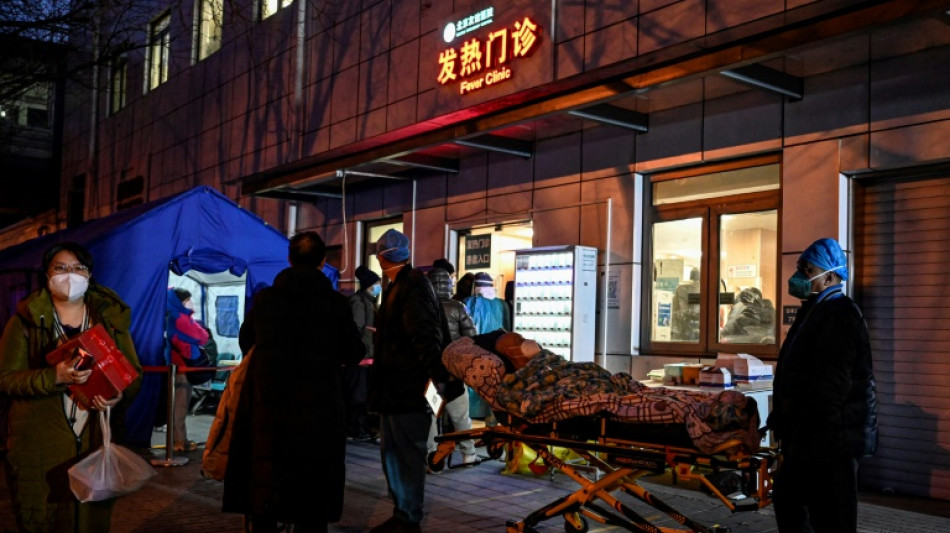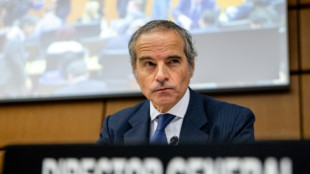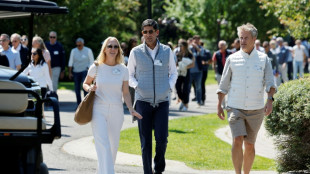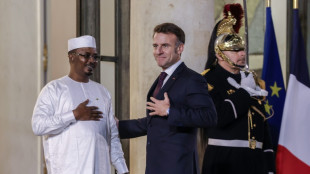
-
 'Schitt's Creek' star Catherine O'Hara dead at 71
'Schitt's Creek' star Catherine O'Hara dead at 71
-
Curran hat-trick seals 11 run DLS win for England over Sri Lanka

-
 Cubans queue for fuel as Trump issues energy ultimatum
Cubans queue for fuel as Trump issues energy ultimatum
-
France rescues over 6,000 UK-bound Channel migrants in 2025

-
 Surprise appointment Riera named Frankfurt coach
Surprise appointment Riera named Frankfurt coach
-
Maersk to take over Panama Canal port operations from HK firm

-
 US arrests prominent journalist after Minneapolis protest coverage
US arrests prominent journalist after Minneapolis protest coverage
-
Analysts say Kevin Warsh a safe choice for US Fed chair

-
 Trump predicts Iran will seek deal to avoid US strikes
Trump predicts Iran will seek deal to avoid US strikes
-
US oil giants say it's early days on potential Venezuela boom

-
 Fela Kuti to be first African to get Grammys Lifetime Achievement Award
Fela Kuti to be first African to get Grammys Lifetime Achievement Award
-
Trump says Iran wants deal, US 'armada' larger than in Venezuela raid

-
 US Justice Dept releases new batch of documents, images, videos from Epstein files
US Justice Dept releases new batch of documents, images, videos from Epstein files
-
Four memorable showdowns between Alcaraz and Djokovic

-
 Russian figure skating prodigy Valieva set for comeback -- but not at Olympics
Russian figure skating prodigy Valieva set for comeback -- but not at Olympics
-
Barcelona midfielder Lopez agrees contract extension

-
 Djokovic says 'keep writing me off' after beating Sinner in late-nighter
Djokovic says 'keep writing me off' after beating Sinner in late-nighter
-
US Justice Dept releasing new batch of Epstein files

-
 South Africa and Israel expel envoys in deepening feud
South Africa and Israel expel envoys in deepening feud
-
French eyewear maker in spotlight after presidential showing

-
 Olympic dream 'not over', Vonn says after crash
Olympic dream 'not over', Vonn says after crash
-
Brazil's Lula discharged after cataract surgery

-
 US Senate races to limit shutdown fallout as Trump-backed deal stalls
US Senate races to limit shutdown fallout as Trump-backed deal stalls
-
'He probably would've survived': Iran targeting hospitals in crackdown

-
 Djokovic stuns Sinner to set up Australian Open final with Alcaraz
Djokovic stuns Sinner to set up Australian Open final with Alcaraz
-
Mateta omitted from Palace squad to face Forest

-
 Djokovic 'pushed to the limit' in stunning late-night Sinner upset
Djokovic 'pushed to the limit' in stunning late-night Sinner upset
-
Tunisia's famed blue-and-white village threatened after record rains

-
 Top EU official voices 'shock' at Minneapolis violence
Top EU official voices 'shock' at Minneapolis violence
-
Kremlin says agreed to halt strikes on Kyiv until Sunday

-
 Carrick calls for calm after flying start to Man Utd reign
Carrick calls for calm after flying start to Man Utd reign
-
Djokovic to meet Alcaraz in Melbourne final after five-set marathon

-
 Italian officials to testify in trial over deadly migrant shipwreck
Italian officials to testify in trial over deadly migrant shipwreck
-
Iran says defence capabilities 'never' up for negotiation

-
 UN appeals for more support for flood-hit Mozambicans
UN appeals for more support for flood-hit Mozambicans
-
Lijnders urges Man City to pile pressure on Arsenal in title race

-
 Fulham sign Man City winger Oscar Bobb
Fulham sign Man City winger Oscar Bobb
-
Strasbourg's Argentine striker Panichelli sets sights on PSG, World Cup

-
 Jesus 'made love': Colombian president irks Christians with steamy claim
Jesus 'made love': Colombian president irks Christians with steamy claim
-
IAEA board meets over Ukraine nuclear safety concerns

-
 Eurozone growth beats 2025 forecasts despite Trump woes
Eurozone growth beats 2025 forecasts despite Trump woes
-
Dutch PM-elect Jetten says not yet time to talk to Putin

-
 Social media fuels surge in UK men seeking testosterone jabs
Social media fuels surge in UK men seeking testosterone jabs
-
Forest face Fenerbahce, Celtic draw Stuttgart in Europa League play-offs

-
 US speed queen Vonn crashes at Crans-Montana, one week before Olympics
US speed queen Vonn crashes at Crans-Montana, one week before Olympics
-
Trump nominates former US Fed official as next central bank chief

-
 New Dutch government pledges ongoing Ukraine support
New Dutch government pledges ongoing Ukraine support
-
Newcastle still coping with fallout from Isak exit, says Howe

-
 Chad, France eye economic cooperation as they reset strained ties
Chad, France eye economic cooperation as they reset strained ties
-
Real Madrid to play Benfica, PSG face Monaco in Champions League play-offs


China's propaganda machine sputters in zero-Covid reversal
China's state media is struggling and censors are working overtime as Beijing gropes for a coherent narrative in the wake of the sudden reversal of its hallmark zero-Covid policy.
For years, the country's propaganda apparatus hailed zero-Covid as proof of the superiority of the Communist Party's authoritarian rule and the wisdom of powerful President Xi Jinping.
But now its usual mouthpieces have been left to spin the decision to scrap strict travel curbs, quarantines and snap lockdowns as a victory even as cases soar.
"State media has not come up with a grand narrative to fully legitimise the sudden and radical change," said Kecheng Fang, an assistant professor at the Chinese University of Hong Kong's School of Journalism and Communication.
"They were caught by surprise."
The "inconsistent messaging" indicated that the propaganda apparatus may lack adequate directives from the party on how to frame the situation, he told AFP.
- 'A stirring battle' -
Some outlets have hinted that not all is well, with state news agency Xinhua and state broadcaster CCTV this week running reports urging people to use Covid medicines "rationally" and highlighting government efforts to guarantee supply.
But government-run publications have refrained from reporting the grimmer side of the exit wave, instead seeking to calm fears of the pathogen's potency and depicting the policy shift as a logical, controlled and triumphant withdrawal.
"Looking back on the last three years, we have waged a stirring battle against the pandemic and gone through an arduous historical test," read an editorial in the party-run People's Daily newspaper last week.
Zero-Covid "demonstrated the superiority of China's socialist system", it said, adding that "optimising" the policy now would help to adapt to new virus variants while "putting the lives and health of the people and masses first".
There has also been a reluctance to address the mounting Covid caseload.
On Friday, a party-run newspaper cited an official estimate of half a million daily new cases in the eastern city of Qingdao. By Saturday, the story had been amended to remove the figure, an AFP review of the article showed.
And while Xi's recent flurry of diplomatic engagements has dominated the headlines, he has not yet commented publicly on the collapse of what was until recently a signature policy.
- 'Severe cold' -
A similar sense of uncertainty has pervaded Chinese social media, where censors routinely scrub out politically sensitive content.
Several posts on the popular Weibo platform purporting to describe Covid-related deaths appeared to have been censored by Friday afternoon, according to a review by AFP journalists.
They included several blanked-out photos ostensibly taken at crematoriums, and a post from an account claiming to belong to the mother of a two-year-old girl who died after contracting the virus.
Posts about medicine shortages and instances of price gouging were also taken down, according to censorship monitor GreatFire.org.
And social media users have posted angry or sardonic comments in response to the perceived taboo around Covid deaths.
Many rounded on a state-linked local news outlet after it reported Wu Guanying -- designer of the mascots for the 2008 Beijing Olympics -- had died of a "severe cold" at the age of 67.
One commenter likened the phrasing to China's dictatorial neighbour North Korea, while another asked: "Is it illegal to say 'Covid' now?"
Yet other critical posts remained online as of Friday afternoon -- including many that took the government to task for its perceived lack of an exit strategy.
"Did they really believe they could wipe out the virus with lockdowns?" read one.
"Three years, and they never made a contingency plan for when it couldn't be controlled?"
Fang, the assistant professor, said Chinese officials would "eventually find a way to frame everything as a victory, maybe after the infection situation stabilises".
"The unique way of counting Covid deaths is already providing a basis for that," he added -- referencing a new government definition of virus deaths that excludes many fatalities.
China on Saturday officially recorded no new deaths from the virus, according to figures from the National Health Commission.
A Weibo hashtag relating to how the country defines Covid deaths -- counting only those who die from respiratory failure after testing positive -- was censored.
Y.Bouchard--BTB



